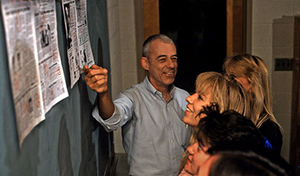
|
|
||
|
|
||
|
|
 |
|

Last Updated on 08/30/15 By Tom
Prefling
Written by Mark "Vultch" Wyckoff J.G. Carlton, a longtime Tucson teacher who helped turn Catalina High School’s journalism program into one of the best in the country, died June 11. He was 79. Under his guidance from 1960 to 1989, Catalina’s weekly newspaper, The Trumpeteer, became scholastic journalism’s all-time national award-winner. It captured a then-record six Pacemakers, the high school equivalent of a Pulitzer, and the highest awards from the National Scholastic Press Association and the Columbia Scholastic Press Association. The real-world experience he gave his students in all aspects of newspaper production — from news to features, sports to editorials, layout to advertising — helped spawn a farm system that populated local and national newsrooms for decades. His students have become writers, editors, photographers, broadcasters, designers, graphic artists, authors, television script writers, public relations managers, crossword puzzle creators — even journalism teachers. “The greatest teacher I ever had,” read a tribute message on Tucson.com by 1983 Trumpeteer alum Joshua Hardy Carroll, now a novelist at Grapnel Press. “There are thousands of us, but only one of him.” Over his nearly three-decade teacher career, in which he taught not only journalism but English as well, Carlton formed a deep bond with his students. That connection continued after retirement. At Catalina, students were drawn to Carlton’s wisdom, his quick-witted barbs and irreverent humor. Affectionately known as “Uncle Dudley,” he would disarm them with pointed quips, amaze them with his crossword puzzle-solving skills and test their minds with newsmaker quizzes. Other times, he would bewilder unsuspecting students by nailing them with a tightly wound rubber band. The rollicking humor, however, served as a rare reprieve from the Trumpeteer’s tough standards, which made most other high school courses easy by comparison. Students had to interview, research, write, edit, critique and challenge all that went into the nationally-recognized weekly. Carlton insisted on keeping a hands-off policy with editorial decisions, allowing instead his protégés to excel or fail on their own merits. “He wasn’t a hand-holder,” Lynda Cuqua Zimmer, a 1963 Trump alum, said when Carlton retired. “He kind of aggravated you to do something.” The rapport Carlton established with his students varied, altering between roles of father, friend, counselor and mentor. Above all, he drove home the importance of esprit de corps and the pursuit of truth. “The truth,” he often repeated, “shall set ye free.” Carlton was a man of habit, favoring a white or blue dress shirt worn with the sleeves up, black coffee, tequila with orange juice and crossword puzzles. And disciplined to a T: crosswords had to be done contiguously, and in pen. He read the paper religiously, and demanded his students do as well. His twice-a-year current-events tests were lengthy and legendary. Carlton took teaching and journalism seriously but not people, least of all himself. He pranked, joked and teased — “Here comes (name) with a snicker and a grin, chocolate Sunday all over his chin” — and affectionately gave many a student nicknames: Fetid Roadapple, Frenchie, Vulch, Smut Queen. He used that humor to connect with students, to encourage, cajole, even challenge them to excel. As close as he was with students, he still remained somewhat of an enigma. His political and religious affiliations, his hobbies and his home life were unknown to nearly all. Students would often describe Carlton as “mechanical, unchanging.” But, at the same time, they relished every little discovery of his habits, from his accumulation of convenience store coffee cups to his love of Havana cigars. One group of staffers, during the height of Watergate, decided to do pull a late-night plumbing prank: They placed a toilet on top of his Sahuarita home so that “duty can be done in high places.” As stoic as Carlton might have appeared, his wife, Muriel, said he was “actually a very sentimental man who gets attached to people and things.” When he retired, for instance, he still had that toilet in his backyard. Born Sept. 13, 1935, in Washington, Iowa, John Guy Carlton Jr. grew up in Dubuque and attended elementary school and high school there. At Dubuque Senior High School from 1950-54, he carried a 96.1 GPA; was sports editor of the school paper; lettered in baseball, basketball and track; and helped the school win the Iowa State baseball championship. As a college student, he freelanced for national sports magazines and worked for The Telegraph-Herald in Dubuque, writing stories, columns, editorials and taking photos. He graduated with a Bachelor of Arts degree from the University of Dubuque in 1958 and a Master of Science in Journalism from the University of Wisconsin at Madison in 1960. At UW, he fused his love for wildlife and geology and developed his own course of study in ecological journalism. He moved to Tucson with his wife in the summer of 1960 and began teaching beginning journalism, advanced journalism and sophomore English at Catalina during the fall semester. In just two years, he transformed The Trumpeteer into a powerhouse. In 1962, the paper captured its first Pacemaker and earned top honors from Quill and Scroll, the international honor society for high school journalism. In presenting The Trumpeteer with its George H. Gallup Award, Q&S judges heaped praise on Carlton. “You are to be commended in the highest sense for a paper that should be a model for schools all over the nation,” they wrote. “The Trump is a ringing challenge to those who say school publications are frills.” Teaching, surprisingly, was not a first-choice career. “(It) was an afterthought, a lark,” he said in 1989, noting he had been lured into the profession during the furor over Soviet superiority following the launching of Sputnik in 1957. “I thought sure, I’ll do this for a year or two, see the world and then get back to journalism,” he said. “But after a couple of years, I became hooked.” Carlton’s dedication to The Trumpeteer was overwhelming. It was not unusual to find him behind his desk at 6 in the morning. On many occasions, especially on Trump production days that continued well past 6 p.m., he would be the last to leave the school grounds. In 29 years of teaching, Carlton missed just half a day. That occurred in the early 1960s when he took his mom out on her birthday. Carlton once said he could not afford to have a family because of the lack of time. When asked about children, he often say, “You kids are my children.” It was a quip, but he meant it. A self-described anachronism — he didn’t even have a home phone — Carlton adhered to values and a work ethic that were uncommon in their time, and all but unheard of today. He steadfastly refused to change the Trump’s weekly format when other high school newspapers switched to slick-looking monthly newsmagazines. Nor did he jump on the bandwagon when other publications began to win awards for writing “global issue” stories about world hunger, abortion and the depletion of the ozone. “Somebody has to be in the trenches and toe the line,” Carlton said. “Nobody can cover the Catalina community like we can.” Such strong exercising of his beliefs hurt him at times. He alienated many teachers, for instance, when he elected not to join their strike against Tucson Unified School District in 1978. Some thought Carlton an elitist, although those who knew him said he supported the teachers’ cause. Other administrators and teachers grimaced at the tough, and sometimes biting, Trump news stories and editorials on education issues. One former Catalina principal dreaded Fridays, when the Trump was published, and once reportedly locked himself in the office and called his wife over an unflattering Trump article about him. As the 1980s came to a close, Carlton decided to put a “-- 30 --” to his teaching career. “There are many factors,” he said in 1989, “and no one factor dominated. But all taken together, it is time.” When he left, former students from all across the country flew in to wish him well at a retirement party at one his favorite watering holes, the now-shuttered Paulos Restaurant on Speedway Boulevard. For all the accolades bestowed upon him that night, Carlton found the attention awkward and undeserved. “He is a genius, I believe,” Muriel Carlton said at the time. “But John doesn’t see it that way. He considers himself very ordinary.” |